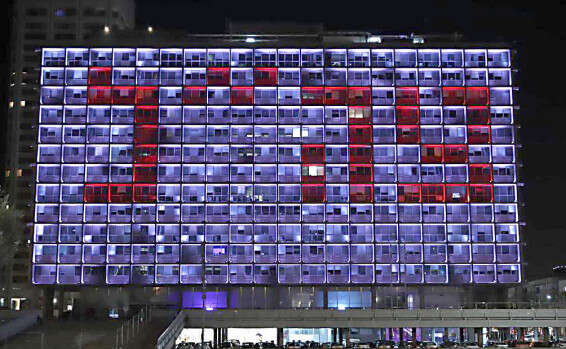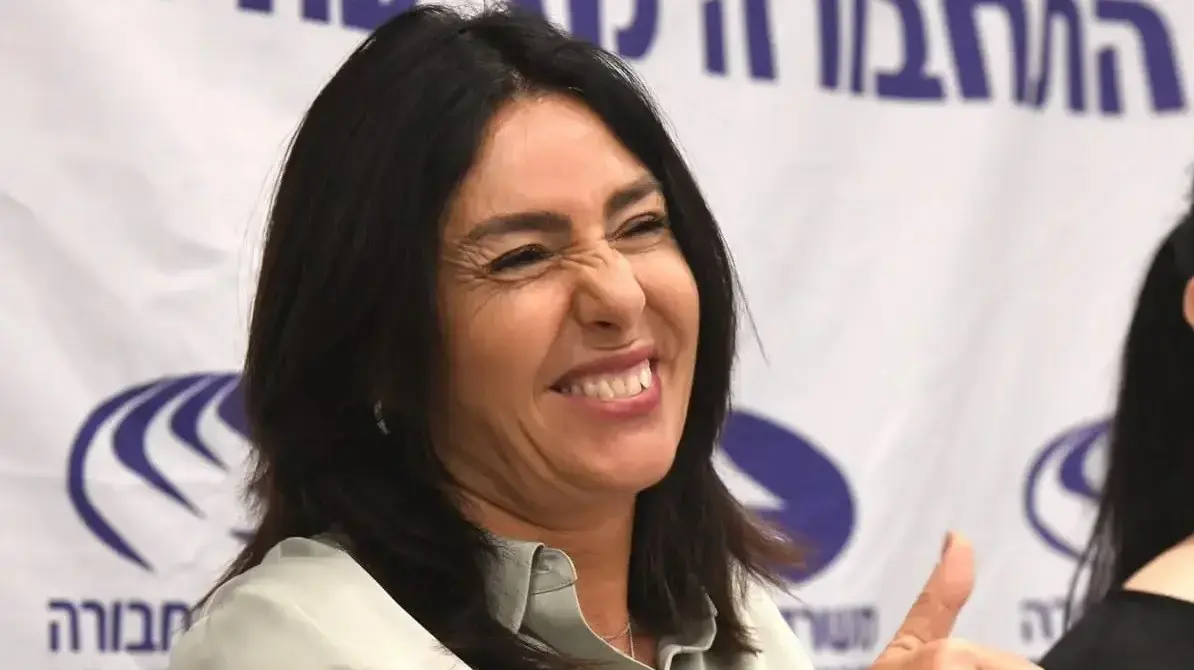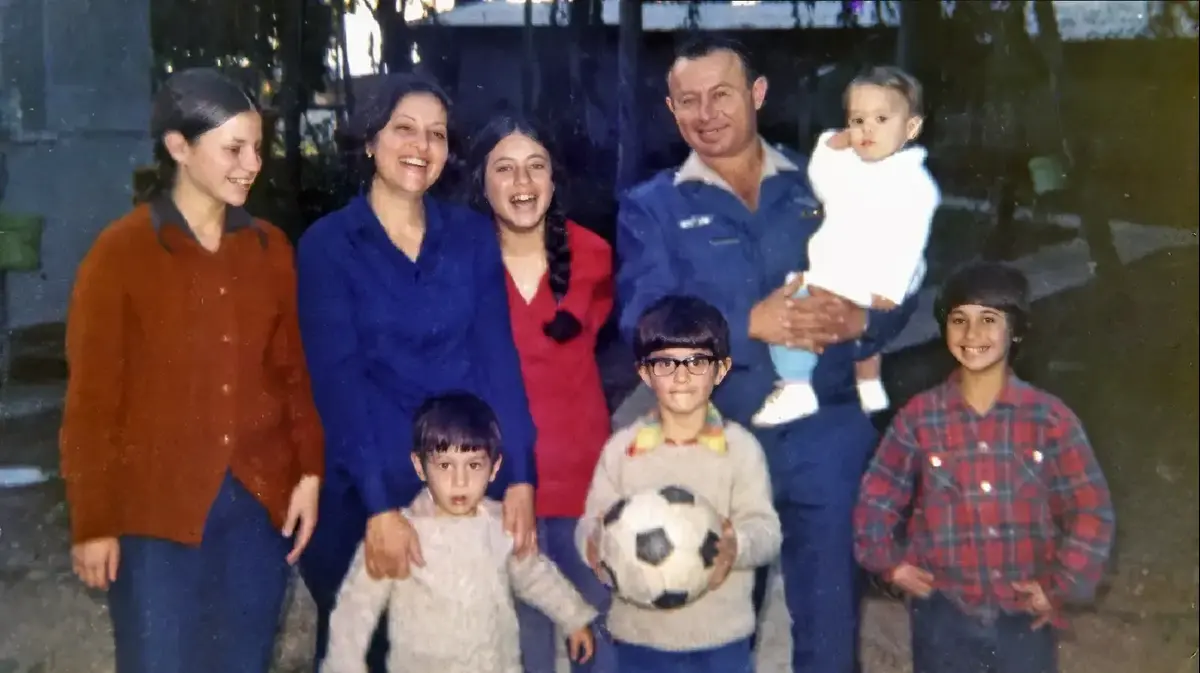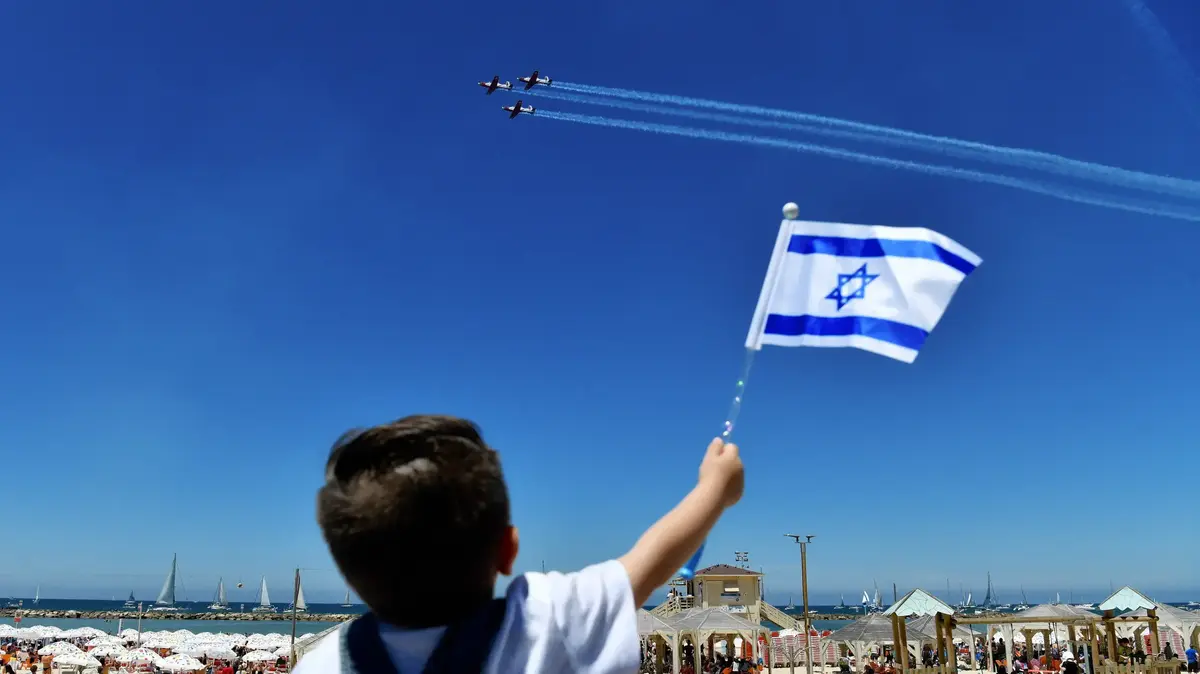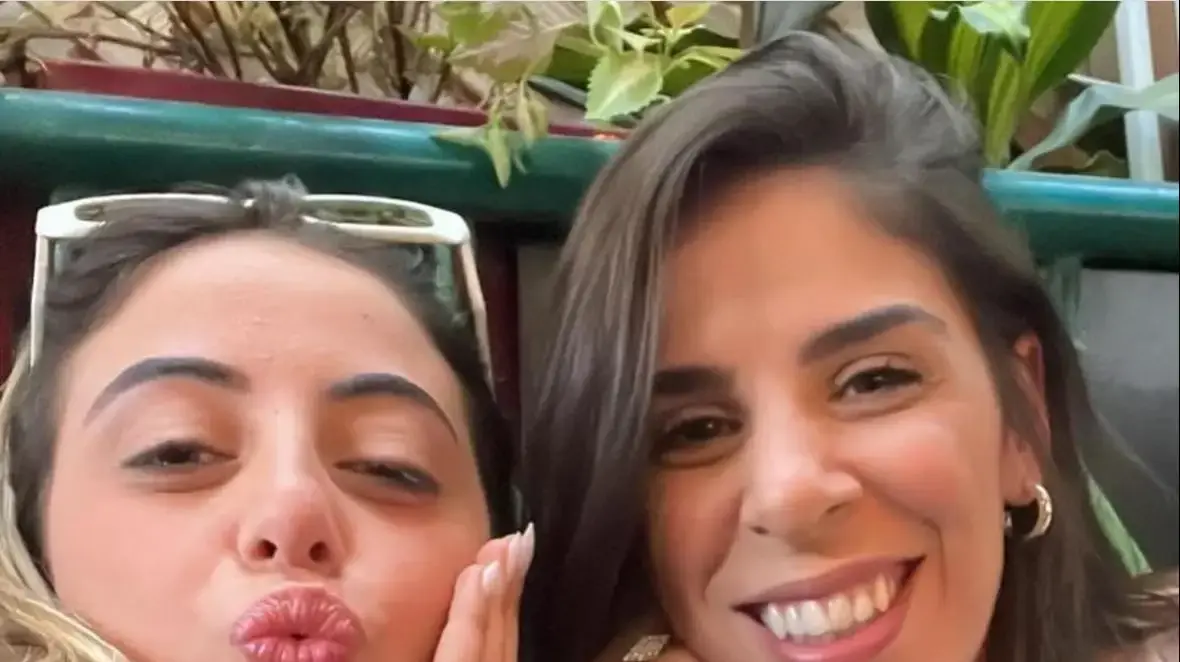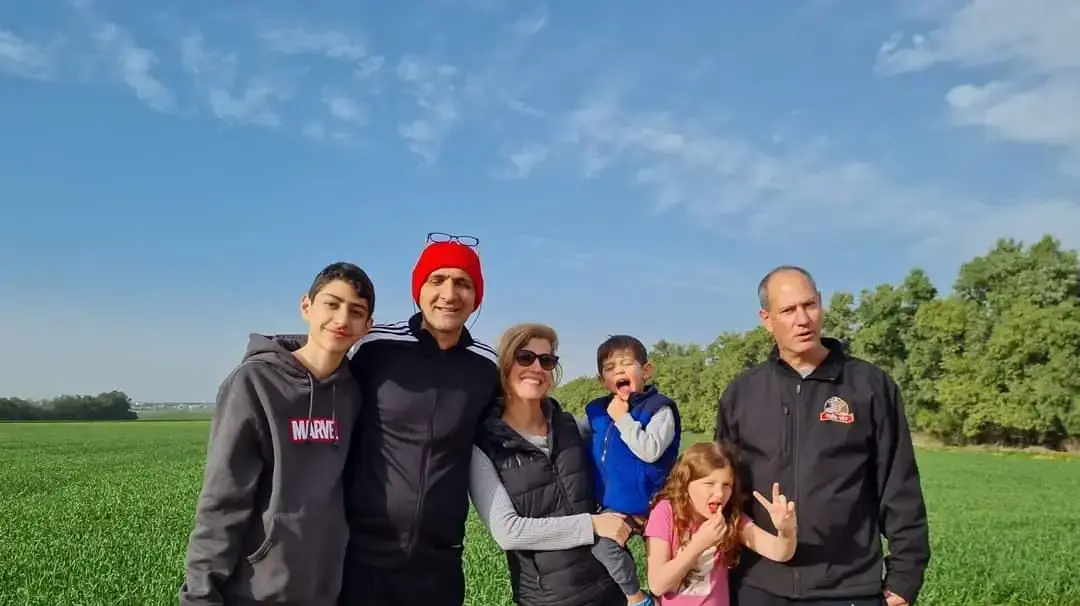57,277 Disabled Recognized by Ministry of Defense • IDF Disabled Chairman: "Some are Struggling for Recognition and Basic Terms" • Special Project
Tel Aviv Municipality, last night // Photo: Tel Aviv Municipality
The State of Israel marks the first day of recognition for IDF casualties and the victims of hostilities in a series of activities and events. According to the 2014 government decision, each year, in Kislev, the IDF Commemorative Day and the casualties of the hostilities will be marked, For the contribution and sacrifice of the disabled and wounded.
During the day and in the coming weeks, the Rehabilitation Division will hold numerous events for the IDF disabled in its seven districts throughout the country, including: group meetings with the disabled, home visits to disabled people over the age of 80, recognition events for disabled people from the various IDF wars and more.
On the occasion of the day of recognition, the Ministry of Defense publishes the official figure: 57,277 IDF disabled persons are currently recognized and treated in the rehabilitation department, including 591 highest-ranking disabled persons, 100% plus. 817 soldiers injured in Operation Ethical Cliff have been recognized as IDF disabled, of which 516 are in the rank Disability rate 20% or higher. Each disabled person in the rehabilitation department has a multidisciplinary team of specialists in the rehabilitation district to which he belongs and a social worker who builds and accompanies his rehabilitation process to provide him with a comprehensive medical, social, employment and welfare response.
The Rehabilitation Division also publishes the scope for the recognition and treatment of disabled post-traumatic victims: Approximately 5,000 IDF disabled have been recognized to date with PTSD.
More on:
• We have a moral obligation to casualties Opinion, Rasan Elian
• The embrace of the people gives us strength to continue to live Opinion, Aaron is close
• For the first time, an association between staying in enemy captivity and serious illness will be examined
• Victory thump: The engineers enlisted for the IDF disabled
According to Deputy Director General and Rehabilitation Division of the Ministry of Defense, Brig. Gen. (res.) Hezi Mishta: "The day of recognition for IDF casualties and casualties is our opportunity as a state to stop the daily race to pay tribute to those who paid a heavy price for state security. The Rehabilitation Division cherishes the IDF's disability daily and works to provide 57,000 IDF's with the best medical care, to give them the full rights granted by the law, and beyond, and to help restore and restore society, education and the workforce. This is our mission. "
In 2019, the Rehabilitation Division's employment consultants assisted with the employment of 329 disabled people and recruited 190 new IDF employers. At the same time, the firm recorded a 92% success rate in preventing the dismissal of the IDF from their jobs. 546 IDF disabled students have studied for a college degree in the past year, funded by the Rehabilitation Department.
Regarding the treatment of the IDF Disability Rehabilitation Department diagnosed as Post-Traumatic Victims: As a general rule, the IDF Disability Recovery Division has undergone extensive reform in recent years. At the center is a proactive approach to anyone who is recognized as disabled, rapid intervention, shortening bureaucracy and building a dedicated rehabilitation program in all aspects: welfare, medicine and employment. Any disabled person who is recognized for PTSD (more than 20% disability) is eligible for individual, couple and / or family psychological treatment. The Ministry of Defense employs the leading experts in the State of Israel. In a variety of therapeutic practices, and special emphasis is placed on rehabilitating post-traumatic victims by incorporating them into the work cycle. In addition, the Rehabilitation Department operates unique therapeutic groups, and occupational daycare centers for quality of life across the country.
"For the IDF wounded, the injury is not a distant memory, no matter when it occurred," emphasizes Idan Kliman, chairman of the IDF Disabled People. "They live it daily, face many difficulties in conduct and routine, suffer from pain and physical and mental limitations. That do not pass and will never be cured. The great majority of them are battling hard for recognition and basic conditions that are due to them, not by grace, in the face of the Department of Rehabilitation in the Ministry of Defense.
"On this day, every citizen and citizen of the country should say one important word to the injured: Thank you."
Female voice: "The injury made me a more sensitive person"
The bus passengers who made their way to the depths of the Gaza Strip on April 9, 1995 were sleepy. They set out from Ashkelon to the Gaza Strip and various localities, a bus full of mouths to mouths, especially the soldiers, who took advantage of the peaceful ride, just days before Passover, to complete a few hours of sleep. Then the huge explosion happened.
"I got into an explosion," recalls Nabat Kahane, 43, when a young 18-year-old female soldier, when a van loaded with explosives, reversed and collided with a bus. The result was extremely severe - eight dead and dozens injured. Some of those killed were those sitting around the germ. Destiny's hand pulled the blast, injuring her moderately to severely, but she survived.
"I didn't feel my hand, and at one point I found that I had bleeding in my head. We got off the bus, me and some friends, and sat in the corner. I saw what was going on and it was hard for me to bother the medics. "I didn't feel it and I saw the edges of my fingers were smashed. It hurt my head a lot and I felt like I was going to pass out."
Wounded in a terror attack near Kfar Darom, Nevat Kahane // Photo: Yehuda Peretz
Nabat was eventually evacuated along with several other wounded to Soroka Hospital, and from there by helicopter to Hadassah Ein Kerem. After a relatively short period of time, she started a new war - to return to the army. The battle was a success, and Nabat became an officer.
The years have passed. Sprout paid off as a social worker and made the issue of helping others her life's mission. "I became more sensitive in the aftermath of the attack. It was always very important to me to help, and it sharpened my mind - that good would defeat evil." Recently, alongside a growing need to tell her own story, Nabat decided that she wanted to bring to the agenda an issue that did not receive resonance with regard to IDF casualties. "One of the reasons I agreed to be interviewed is to bring the female voice, which is in the minority among the IDF disabled and disabled. "A voice that doesn't get enough room, even though there are a lot of warriors and combat supporters today."
"Still experiencing the attack, every day and every night"
"I still experience this attack every day and every night. Every day I see my boyfriend, Yossi Kirma, who was killed," says Sergei Botsikin, the policeman of the YSM motorcycle unit about his life-altering incident, and on whom he received the IDF The Commissioner.
It was a routine day in Jerusalem, October 9, 2016, at the height of the terror wave of that year. "We started the day calmly," Botsykin recalls, "around 10:00 we heard shouts about, 'Shooting in front of Ammunition Hill.' We jumped on the motorcycle without thinking twice. Yossi drove, I was behind."
A terrorist opened fire at people standing at the light rail station in front of the police headquarters, fatally wounding her son Malihi, who later died of her wounds, and another woman, and fled. Kirma, who was first commanding a fighting force, and Botsikin reached the Sheikh Jarrah neighborhood, where the terrorist fled, along with other forces, and a shootout ensued.
Wounded in an ammunition hill attack, Sergey Botsykin // Photo: Police spokeswoman
"Yossi grabbed the bullets first and we fell," Botsykin recalls. The motorcycle fell on the two, and at the same time struck a bullet in Sergei's arm. Yossi was fatally wounded in the head and later his death was determined. "I turned in the direction of Yossi and somehow managed to get out of the motorcycle. I turned to him, tried to pull him with my left hand and grabbed another ball in the leg.
Botsykin walked three yards from the incident, injuring his arm and leg, and holding the weapon in his left hand. "I knew I had no chance, but I had to neutralize him to stop the killing." He stormed towards the terrorist, opening fire from his weak hand. He then identified additional forces and captured his weapon. At this point, the terrorist was eliminated, Sergei collapsed and was in a mediocre condition at the hospital.
Three years have passed since the aggravated event, and Sergei never returned. He cannot return to the motorcycle unit, and serves as a fitness instructor in the unit. At the same time, he is dealing with post-trauma. For his work, Sergey received a commander-in-chief. The late Kirma received the masterpiece.

